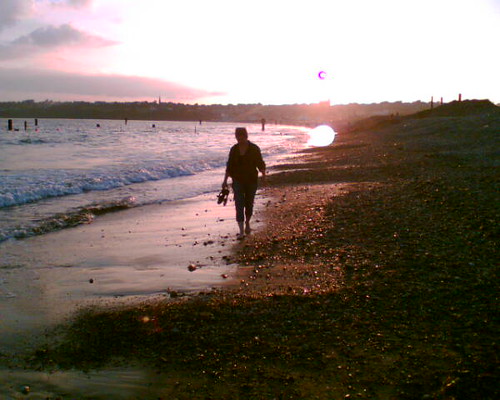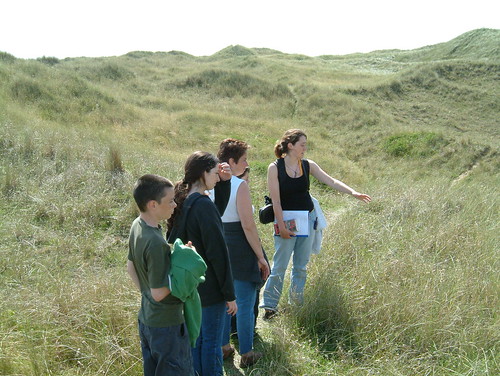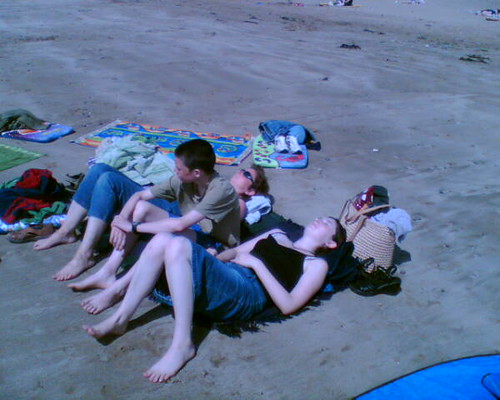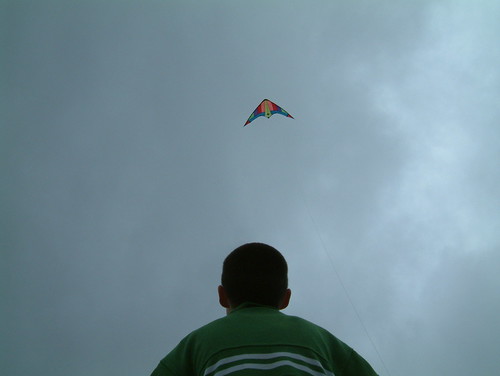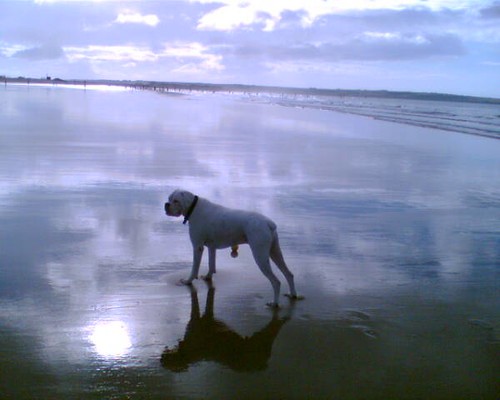Wednesday, August 31, 2005
Blog Day 2005
Jon's Thoughts on Everything: I can't find Jon Maddox's profile, so I don't know much about him, but he's alerted me to some cool tech stuff.
Eamonn Fitzgerald's Rainy Day: Anyone with a name like that has to be cool. Plus, he's a hell of a writer.
Education Technology - Tim Lauer: The principal at Lewis Elementary School in Portland, Oregon. I bet he would have made my education a lot more fun.
vanillasky: A woman in Manchester (England) who has changed my view of the city.
Charlie's Diary: Charles Stross's blog is as entertaining as his books.
Tags: Blogging, BlogDay2005
Tuesday, August 30, 2005
Odds and ends
But Is There Intelligent Spaghetti Out There?: The New York Times notices the newest religion on the block -- Pastafarianism. This a brilliant way to combat efforts to mandate the teaching of "alternate" theories of creation in science classes. I don't have a problem with teaching kids Intelligent Design or even straight Creationism, just don't do it in science class. It isn't science.
Hollywood, Microsoft align on new Windows: CNET's News.com writes about how Microsoft is adding new digital rights management in the next version of Windows, locking down literally everything to please the film studios and record companies. History seems to be repeating itself in the computer industry. I remember when word processors, spreadsheets and games came with "copy protection." Some companies went as far as requiring users to install a dongle on the back of their computers before their applications would run. Users ran away, in droves, and turned to software that wasn't such a pain in the ass to use -- shareware and, ironically, Microsoft's products, such as Word. Cory Doctorow gives Microsoft a tongue-lashing over the plans.
And, while I'm on the subject, here's another good essay on why digital rights management is an unworkable idea (via Tim Bray's site again).
Inequality and Risk: Paul Graham takes apart the apparently laudable goal of reducing economic inequality. What happens if you try to narrow the differences between rich and poor? He argues that we're aiming at the wrong problem.
Leonardo da Vinci: Qualities of a Genius and How to Think Productively: "These strategies are common to the thinking styles of creative geniuses in science, art, and industry throughout history."
A War to Be Proud Of: Christopher Hitchens finds the Iraq war to be a glass half-full, rather than half empty.
On the same subject, Andrew F. Krepinevich Jr. argues in Foreign Affairs that the U.S. has to adopt a better counterinsurgency strategy. His approach, borrowed from the British in Malaysia, sounds like it could work -- in 10 years, with two or three times the current troop level.
Neat software:
- Partition Logic: a free equivalent of Partition Magic and Norton Ghost. It still seems pretty limited, however.
- Stellarium Astronomy Software: Easy to use software for finding stars and planets.
- Real-time HTML Editor: Play around with HTML on the top of the screen and see how it looks, immediately, in the bottom.
Monday, August 29, 2005
Home base
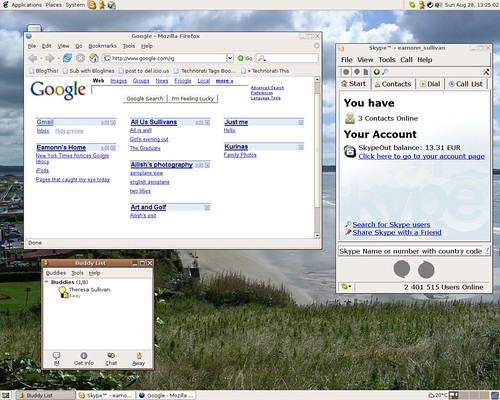
I made a rash promise a few posts ago to write down how I use computers today, both to laugh at it in 10 years and just in case there's anything I'm doing that may be useful for others in the family. But I can't go too far without mentioning Linux, thereby outing myself as a hard-core geek. Bear with me through this one, please. I'll get back to some stuff that my family will actually use in subsequent posts.
First, some basics: Linux itself is just the kernel -- the lowest level of the operating system, the part that runs the hardware, loads the drivers for peripherals such as printers, keyboard and mouse, and manages how applications share the processor, disk and memory. It was originally written by a Finnish student named Linus Torvalds, who is still the main guy in charge of its development, although there are now many programmers working on it.
On top of that are basic Unix-like utilities, primarily written by an organization dedicated to free software called the GNU Project (it's a recursive acronym, meaning GNU's Not Unix). Richard Stallman, who founded GNU, prefers to call the whole system "GNU/Linux," since Linux by itself would be useless. He's right, of course, but most people still just call it Linux.
On top of the kernel and basic utilities, there's the X Window System, a basic graphical environment originally invented at MIT in 1984. Above that is a desktop environment (the menus, file manager, etc.), the two most popular of which are Gnome and KDE.
Since there are so many, independently developed parts to Linux, most people use it by installing a "distribution," which packages everything together for easy installation. I first played around with Linux using a distribution put out by Texas A&M University (TAMU) in 1992, but the first easy one I used was Slackware. If I remember correctly, I had to download 30 or 40 disk images for 3 1/2 inch floppies. I couldn't get the darn thing to boot from the hard disk -- I had to boot from a floppy and everything else ran from the hard drive. But it ran, and ran and ran. It was the most stable thing available for a PC, bar none, and I was hooked. I've run Web sites on it since late 1993 and it's always what I come back to it for my own, personal work. I may spend most of my time on Windows, since I've always been required to run it at work, and I like Mac OS X, but Linux is my preferred home base.
I've tried many distributions since Slackware, including Red Hat, and now use a Debian-offshoot called Ubuntu. Each has been progressively easier to use and more sophisticated. Ubuntu, in particular, is close to the point where a normal (i.e., non-geek) could use it for everyday work. Installing it is the toughest part, but have you ever tried to install Windows on a bare hard drive on a new PC? Ubuntu is actually much easier than that. It usually just works. It's when it doesn't that you'll need a little help. There's also a "live" CD that you can boot and run the distribution from, which is useful for checking if the installation will work for your hardware. (My Ubuntu PC is what's in the screenshot above.)
One of the aspects of GNU/Linux that I find most fascinating is that it works despite turning traditional economics on its head. The software is copyrighted, just like Windows or Office, but it is shared with a license (primarily the GNU General Public License) that requires the distributor to let users have the source code, the underlying instructions that companies such as Microsoft keep secret and guard like the crown jewels. Any modifications to that source code must be distributed with the same license, i.e. made available to everyone.
The result is that GNU/Linux operates like an open consortium. Most of it is now worked on by paid developers at corporations that benefit from it. If you use Google or Amazon or have a Tivo, you use GNU/Linux. There are several Linux-powered mobile phones now. Nokia, for example, is releasing a wireless Web device this year, running Linux. The license is the key. If Google makes an improvement to the operating system, it benefits, but so does Amazon, IBM and Novell. But Google is glad to do this, because it gets any improvements made by Amazon or IBM. Sharing benefits everyone. (And, by the way, there's nothing in the license that prevents people from selling Linux, and they do. Most people aren't programmers, so the source code is useless to them, and they're paying for the convenience and support.)
Linux lets me be as geeky as I want. If I'm curious about how the operating system works, I can find out, as far as my curiosity leads me, right down to the most basic level. And since thousands of people and several dozen (at least) companies depend for their survival on Linux, I can opt out of the so-called operating system wars. I don't care if Windows takes over the world and everyone has to follow its twists and turns just so they can keep accessing their own data. Linux isn't in that rat race and is the safest place to keep my stuff. Even if it never breaks out of its 2 percent or so market share of desktops, people such as researchers, students, programmers and startups will run it, and improve it. The economic benefits are too great, and the license ensures that I benefit from their improvements.
The big change in the past 10 years is that the disadvantages of Linux have slowly been going away. In the past, what you gave up in using Linux was access to the latest in cool software. Today, the world is coming to us. The Internet and standards-based systems means there are relatively few things developed on Windows and the Macintosh that I can't make use of or find an easy alternative. And much of the best software is written for the Internet directly. The best email program right now is probably GMail, for example, which runs on a Web site. I was able to use Google Talk right away from Linux because it uses a standard instant-messaging system called Jabber. I can open and write Word documents, edit photographs and videos, watch DVDs and write Web pages. Even some of the hottest software, such as Skype, are often available on Linux because it is where the so-called early adopters are. They're the people that will try new stuff first and tell their friends about it (like me).
I'll probably never be able to recommend Linux for everyone in my family, but it's an integral part of my own use of technology, allowing free exploration. And that's good enough for me.
Tags: Technology, Computers, Linux, Ubuntu
Relaxation

Relaxation
Originally uploaded by Eamonn_Sullivan.
One of Ailish's shots of Dude sleeping on the couch. (Yes, he has us well trained.) The dude knows how to take it easy.
Tags: Pets, Dogs, Photos
Kenwood House concert
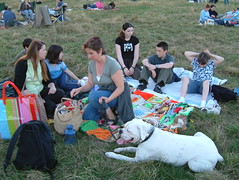 Kenwood House concertOriginally uploaded by Eamonn_Sullivan.
Kenwood House concertOriginally uploaded by Eamonn_Sullivan. It's Bank Holiday weekend in England, the traditional end of summer. Last night we went to Hampstead Heath for the proms, a classical music concert/flag waving/fireworks event. It was a clear, mild evening -- light jacket weather. My sister Kathy (far left in the photo) and Theresa put together a picnic of fruit, shrimp, olives and wine. The kids played a portable version of Trivial Pursuit and cards. Even the dog was content. (One couple came up to us after the fireworks to comment on how amazed they were that Dude didn't flip out.) It doesn't get much better than this.
The concert in the park is held every year but we've only been once before. There's a main area, where you can sit if you've bought tickets (in the £20 to £25 range, I think), but we plant ourselves on a hill near the concert. We can't see the performers, but we can hear the music very well, and we're surrounded by similar groups of picnicking families. At the end of the evening, we have to walk about a mile through the middle of the park in total darkness. We gave the kids candles in lamps, which gave us just enough light to avoid running into a tree or falling off the path. Just.
Ailish got a few shots of the fireworks, which you can find here. Here's one that came out particularly well:
Tags: Family, Hampstead Heath, Concerts, Fireworks
Sunday, August 28, 2005
iPods
First, get a cover for your iPod. While the body of the devices are pretty rugged, especially the iPod mini, the screen scratches easily. Mine is difficult to read right now and it's because I put the iPod in the same pocket as my keys, just once. That's all it took to get thoroughly scratched up. It doesn't matter what you get, as long as you can access the controls (get the right cover for your model of iPod).
Second, set up iTunes to record in MP3 format, not Apple's AAC. While Apple's format is better in lots of ways, MP3 files can be played on almost anything and you won't notice the difference in sound quality. iPods happen to be the best music player right now, but that may not be true in five or 10 years. Don't get tied to Apple.
Third, avoid collecting lots of music that has been "protected" with digital rights management. People have been so brainwashed by a constant barrage of propaganda about piracy that it isn't worth getting into an argument about it. Just trust me on this one, or read many people who argue this better. DRM isn't good for you, nor is it good for the record companies. The latter just don't realize it yet. That means, for the moment, buying most of your music in CD format and recording it yourself (check first that it isn't a "protected" CD) or spending your money on sites that give you more freedom. Magnatune and MP3tunes.com are good ones.
Saturday, August 27, 2005
Pages that caught my eye today
SoYouWanna.com home: The ultimate how-to site. How to do almost anything.
Business 2.0 - Magazine Article - Printable Version - The $50 Million Giveaway: Do you have a killer business plan for any of these ideas? Someone's waiting to give you money for them.
Why Atheism?: A well thought out discussion of the intellectual case for atheism. I've been linking to a lot of sites about religion, so here's something for the other side.
VanderWorld: Smart Women Don't Get Laid: A smart woman response to a study that says men are smarter than women. I must be well below average because most women I know are smarter than me.
Code Craft - Freedom languages: Good description of the difference between "freedom languages" (i.e. perl, python) and "safe languages" (C++, Java). I'm inclined toward the freedom side for various reasons (see next entry).
Why Good Programmers Are Lazy and Dumb: Interesting article about working efficiently and creatively. Applies to more than just programmers.
The Law West of Ealing Broadway
The prosecutor stood up apologetically and told us that she could not find the case papers, and that the policeman who had come to give evidence did not have any papers either. She asked for an adjournment and I gave her a sceptical glance and asked for comments from the defence. This seemed to take the solicitor by surprise and he mumbled and faffed about the distance that his client had travelled. 'Are you opposing the application to adjourn?' I asked him. The penny dropped and he said that he was. My colleagues' agreement took a few seconds to check, and we said that we refused to adjourn and that the Crown must proceed. At that point she bowed to the inevitable and offered no evidence, whereupon we dismissed the case.
We looked at the defence brief expecting an application for costs, but it took a pointed question from the clerk to jolt him into it. We made an order that his client's costs be reimbursed out of central funds.
We wasted an hour or so of court time, plus the defendant's costs. A police officer wasted most of a morning. A man who might have been guilty was acquitted because of a prosecution foul-up that a ten year-old should have been able to prevent - how hard is it to keep hold of an A4 folder?
Tags: Law, Blogging, London
Friday, August 26, 2005
Cory Doctorow's Eastern Standard Tribe
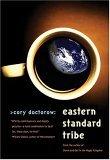
Cory Doctorow's Eastern Standard Tribe is a look at what life would be like with all barriers removed by instant communications -- except for the need to sleep.
The action happens in two familiar places for me, London and the Route 128 area around Boston. The main character, Art, leads a double life: He's a "user experience" designer and a spy for the Eastern Standard Tribe, those who choose to live on New York and Boston time, no matter where they actually reside. Art has been sent to sabotage the rival Greenwich Mean Tribe by designing systems for the megacorporation Virgin/Deutsche Telekom that appeal to the executives and bean counters, but are almost entirely unusable. His aim is to gum up the already inefficient Europe, widening the economic gap between GMT and EST. This is a bit too plausable for comfort, especially for someone who rides the Tube every day. I can think of many other products, laws and procedures that are apparently designed by sadists.
The story opens, however, when Art's life has already gone off the rails. He's on the roof of an insane asylum outside Boston, trying to decide whether to give himself a lobotomy by sticking a pencil up his nose. How he got there is told in flashbacks, involving corporate intrigue and backstabbing over a proposed music-swapping service designed to boost road toll revenue for his real employer, MassPike.
The writing is excellent, extremely funny and done with a lighter touch than in his latest, Someone Comes to Town, Someone Leaves Town. I only wish the book was longer. At only 221 pages -- in very big type -- I finished it in just a few daily commutes.
Definitely recommended for my friends in family in both time zones.
Tags: Book Review, SciFi, Cory Doctorow
Wednesday, August 24, 2005
Google Talk pluses, and a lot of minuses
 Google gets so much publicity whenever it does anything at all that I feel like a cog in its marketing machine just writing about it. But since I started last night, I better finish with some initial observations on Google Talk.
Google gets so much publicity whenever it does anything at all that I feel like a cog in its marketing machine just writing about it. But since I started last night, I better finish with some initial observations on Google Talk.First, the pluses: It's dead simple to setup and use. A friend called me tonight on Skype and the quality wasn't great -- my friend kept breaking up, although he heard me fine. We switched to Google Talk and he sounded much clearer, no break up at all. You can't draw conclusions from one call, and Skype usually sounds much better, but my initial impression was good. I also haven't made any special changes on my wireless router for Google Talk, which I've done for Skype. Adding contacts was simple too, as long as they have a gmail account. Finally, I was able to connect to Google's service from Gaim on Linux, so put a checkmark next to the standards compliance.
Now for the negatives. Skype needn't worry right away. There's no way to make or receive calls from regular phones (equivalents of SkypeOut and SkypeIn, respectively) and no voicemail. Calls and chats aren't encrypted, the voice calls work on Windows only and I didn't see any way to have group chats (I might have just missed this feature). The standards compliance has some limits, too. There's no way yet to initiate a call to someone who isn't on the service (such as a member of another Jabber server). Many of these limitations are mentioned already in the documentation on Google's site, so there are probably plans to address them.
A couple of similarities: The voice calls are peer-to-peer, like Skype's, and the basic user interface is remarkably similar.
Conclusion: In a few iterations, once Google follows through on some of its promises, Google Talk could be a winner. In the meantime, at best it's something that I'm going to run once in a while, alongside Skype and Gaim.
[Update: SkypJournal does a better point-for-point comparison.]
Tags: Google, Google Talk, Skype
Tuesday, August 23, 2005
Google Talk?
According to a person who has seen the service, Google plans to let users chat using more than just their keyboards. Like similar programs from competitors, Google Talk also will let computer users with a headset have voice conversations with other computer users with headsets, this person said.
As I've said previously, Skype will have a hard time competing if the big boys get into Internet telephones, and it sounds like one of the biggest boys around is moving in. But I wouldn't start planning Skype's funeral right away. Google has a mixed record when it comes to catching up. Its Hello photo-sharing service, for example, is nothing to write home about, and its customized home page is rudimentary. I'll also be disappointed if Google Talk just supports Windows, and not the Mac and Linux.
The best scenario would be if Google bases its product on open source, like Jabber (which I've heard suggested) or maybe by adopting something like Gizmo. The company has done it before, when it used the open-source VLC media player for its video service.
The second-best scenario is that Google adheres so well to existing standards, such as SIP, that the company won't have to create a different client for every operating system, you'll just be able to use existing ones.
[Update: It's out already. Download squad has a review. It's based on Jabber, so that means it may be best scenario #1. I'm using it now with Gaim on Linux. The voice calls, of course, don't work with anything but Google's own client, just on Windows, but the company says it's aiming for interoperability with other voice clients. Colour me initially impressed.]
[Update2: You can get it here. Instructions for setting up Gaim and other clients here.]
Tags: Google, VoIP, Technology, Instant Messaging
August garden tour
On the plus side, it'll stay mild well through October, so I can't complain. OK, yes I can.

The grapevine produced its first crop, after a couple of years of just taking up space.

We finally got the knack of growing tomatoes. We grew this year's batch in a container outside our kitchen window, well out of the reach of our dog and slugs.

I still can't identify a single one of the flowers. This is, um, a blue one. With a bee.
Tags: Gardens, London
Klingon Fairy Tales
(Via BoingBoing)"Goldilocks Dies With Honor at the Hands of the Three Bears"
"Snow White and the Six Dwarves She Killed With Her Bare Hands and the Seventh Dwarf She Let Get Away as a Warning to Others"
Monday, August 22, 2005
Painless backup (without boring myself to death)
Every word I typed into those machines, except for a fraction on yellowing paper, is gone forever. This isn't a great loss, admittedly. My reports on the ping-pong tournament at MIT and the planning commission in Springfield, Vermont, didn't advance human knowledge much. And if I threw an insightful question at Jack Kemp, Michael Dukakis or Jesse Jackson during the 1988 presidential primary in New Hampshire, it was accidental and promptly edited out.
But there are things I want to keep: my music, photos and some personal writing (the forum for which has varied over the years). Retaining data, through rapid technology changes, companies that come and go, and changing technology fads (5 1/4 floppy disks, anyone?), isn't rocket science: Decide what's important, maintain at least two copies (preferably far apart) and keep the bits in a format that isn't going to be forgotten down the road. Unfortunately, I'm not a rocket scientist and have lost countless files that I cared about. I spent years writing a weekly column in the 1990s, for example. A Google search turns up five hits, only three of which are actual columns. And they're not even very good ones.
One of the reasons I've lost so much is that I hate backing up my data. It is so incredibly boring that I've spent about two days writing that last sentence. I just can't bear it. The only way I've found to keep my stuff from disappearing at the next move, natural disaster or mouse-click-too-many is to make backing up a side effect of something else I want to do.
For example, my photos are on my hard disk and on Flickr. I just want to share my photos with my family, friends and the occasional complete stranger. The side effect is that my photos are in two different places, separated by about 6,000 miles (London and someplace in California). Similarly, my music is on my hard disk and the MP3 player du jour (currently an iPod). I just want to listen to my music on the Tube. Keeping my Led Zeppelin collection safe from hard disk crashes and house fires is just a nice extra.
Keeping documents is a little harder. Fortunately, in a fit of total madness one week a few years ago, I learned rsync. It took me days of hairpulling. But by the end of it, I learned to set up an automated process that keeps the downstairs computer in sync with the upstairs one. [Update: here's a good recent explanation of the process. That's basically what I do.]
And anything really important, I email it to myself on gmail, in searchable text. Et voila! My stuff is in two places -- on my hard disk (at least once) and in Google's server farm, someplace on an earthquake fault line. I feel safer already.
Tags: Backup, Technology, Computers
Saturday, August 20, 2005
Computer Independence
In 1995, I was forced to run Windows at work, used Linux at home and wanted a Macintosh to play with. Back then, I wrote reviews for PC Week (now eWeek) and thus had a whole lab full of cutting-edge hardware, free software and a fast permanent connection to the Internet. I was already a neck-deep in the Web, running PC Week Labs' site (one of the few print publication sites to start in 1994, complete with discussion forums written in Perl).
Today, I'm still running Windows at work, use Linux at home, and can't afford a Mac. The difference is that it doesn't matter nearly as much. My "lab" is my living room, but the software that counts is free, the hardware that I can build myself for a day's pay outstrips PC Week's fastest workstations by several orders of magnitude and my home connection to the Internet is speedier than the one at work. And what clinches it is that I can start this sentence at work (Memo to boss: No, I'm not), write the middle of it on an Internet PC in the Eurostar business lounge at Waterloo station in London, type a bit more of it on my Blackberry, and finish it on my Linux PC at home.
In short, what computer I'm using is less and less important. The applications I like -- Firefox and Skype, for example -- are available on all three operating systems. The data that matters to me -- my email, Web bookmarks, photos, the blogs I follow, documents and contacts (the latter primarily kept in GMail) -- are accessible from just about any make or model.
For most of my friends and family, however, this may seem irrelevant. They're still running one computer, or at most two (home and work). Why is computer independence a good thing? One word: Freedom. I really don't care what Microsoft does, or who wins the operating systems war. I'm not drooling over the next promised upgrade of Word. And if I manage my data carefully, I don't care who gets reaped in the next Dot-Bust. I still want a Mac, of course, but when I get it, migration will be a breeze.
Over the next couple of posts, I'll take a look at my current strategies for keeping independent.
Tags: Software, Internet, Technology
Flickr Toys
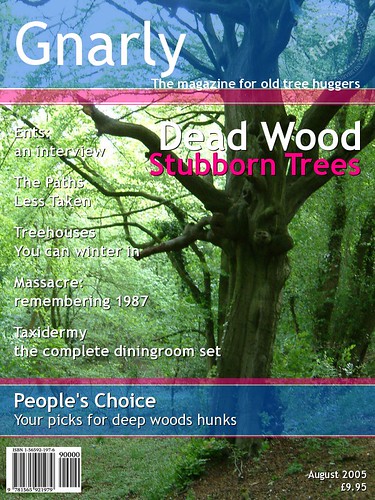 This magazine cover maker (which I used to make this image out of one of my photos from High Wycombe) is one of a collection of Flickr Toys. There are many others listed on the Great Flickr Tools Collection. Remember when, way back in the last decade of the 20th century, when columnists and other opinion shapers were talking about how the Web was going to kill Microsoft? The idea was that new applications would be built on the Internet, making the operating system (and programs like Word, Excel and Outlook) irrelevant. Sites like Flickr, Amazon, eBay and Google (with its Maps stuff) are making it happen, finally.
This magazine cover maker (which I used to make this image out of one of my photos from High Wycombe) is one of a collection of Flickr Toys. There are many others listed on the Great Flickr Tools Collection. Remember when, way back in the last decade of the 20th century, when columnists and other opinion shapers were talking about how the Web was going to kill Microsoft? The idea was that new applications would be built on the Internet, making the operating system (and programs like Word, Excel and Outlook) irrelevant. Sites like Flickr, Amazon, eBay and Google (with its Maps stuff) are making it happen, finally.I bet few were thinking of these kinds of applications back then. But from such small things...
Tags: Flickr, Photography, Development, Web
Friday, August 19, 2005
ReligionFacts.com - Just the facts on world religions.
Looks like an excellent site. If you were ever confused about Tibetan and Zen buddhism or how a Sunni Muslim is different from a Shi'a, this is the place.
Cringely on "patent reform"
Good column this week, focusing on following the money in patent legislation. The patent system, almost everywhere in the world, is in a bit of a mess. You wouldn't think it matters to you and me, but it's the same system that encourages companies to make new things like medicine. It's also one of the hardest things to tinker with. One change can have numerous unitended (or intended, but non-obvious) side effects. Want to scrap software patents? Good, I agree with you, but how do you define software? Where do you draw the line on inventions such as antilock brakes on cars, which run on software? Patent reform will be tricky, and anyone who tells you it isn't, doesn't fully understand the situtation.
Tags: Patents, Intellectual Property
Tuesday, August 16, 2005
Cory Doctorow's Someone Comes to Town, Someone Leaves Town
 Cory Doctorow's Someone Comes to Town, Someone Leaves Town is a pleasant surprise. I thought I was buying a science fiction book (having read nothing about it beforehand), got something closer to a Stephen King novel, and enjoyed it.
Cory Doctorow's Someone Comes to Town, Someone Leaves Town is a pleasant surprise. I thought I was buying a science fiction book (having read nothing about it beforehand), got something closer to a Stephen King novel, and enjoyed it.The main character, Alan (or Andrew, or Aaron, Arnos... Only about half the cast have fixed given names) is the son of a mountain and a washing machine. And I don't mean a big guy and an overworked housewife. He's the offspring of a geographical formation and a household appliance with a fertile spin cycle. But, other than a missing belly button, he apparently looks normal enough to blend into a Toronto neighbourhood. The same can't be said of his brothers, three of whom are like a Russian doll, one inside the other. The smallest of this trio goes missing, a victim of possible foul play by an evil sibling, and the race is on to find and stop the villain.
Doctorow wields the ridiculous premise as well as Stephen King, like playing a game of chicken with the reader: How far can I go before you stop reading and swerve away? Doctorow has King's knack of keeping you reading with a quick-moving plot. I didn't find myself having to slog through any part of the book.
He's not quite as good at painting the characters. Preposterous stories need big ones. King fashions his with a sledge hammer and neon graffiti. Doctorow is a little too subtle. Three quarters of the way into the book, for example, a neighbour tells Alan/Adam/Andy that he's the weirdest person she's ever met. But the mountain/washing machine background is a secret she doesn't know. Why does she find him weird? His actions so far struck me as only mildly eccentric. Does he snort when he laughs? Keep his top button fastened in summer? Cut his hair with the help of a cereal bowl? Without a bit more colour, that line has to be taken on faith. That's a minor quibble, however. Other characters in the book -- the love interest with bat wings growing out of her back, the cyberpunk trying to turn Toronto into a wireless Internet Mecca and the evil mountain spawn -- are drawn more boldly.
It's the first book I've read by Doctorow, who I've encountered previously only through his blog posts championing fair use and opposing copy protection (digital rights management) . I agree strongly with his talk, and Doctorow walks the walk. The entire text of Someone Comes to Town can be read online, if you want. I suspect that helps sales of his books, not hurts as we've been brainwashed into believing.
I bought my copy, taking advantage of the author's offer to sign every book sold online through a local bookstore, and I'm looking forward to exploring his other books.
Tags: Book Review, Fantasy, Fiction
Sunday, August 14, 2005
YouTube
Tags: SocialSoftware, Video, Filesharing
Back home
Every year is different. When we first started going to Tramore from London, seven years ago, we were still pushing strollers. This year, every child swam well enough to use the Guillamene and place bets at the Tramore Races, while the dog took much more time than a toddler.
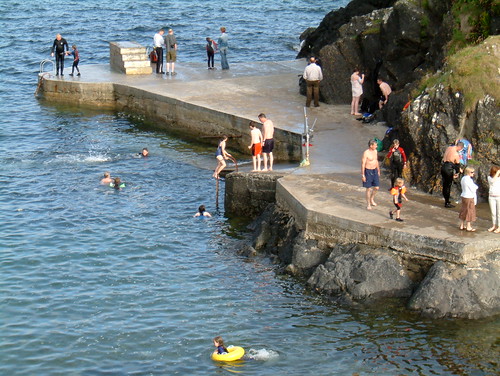
The Guillamene (pictured) wouldn't be allowed anywhere but Ireland, and I suspect the lawyers will catch up some day. It's made up of cement platforms built into the cliffs, with sheer drops into water 40-feet deep. It's where my mother learned to swim and some of the crazier locals use year-round. The scenery is beatiful, but the water is frigid. My dive watch measured the water temperature at around 16C, though it's not accurate unless worn outside a wet suit. I'd say it was closer to 12C or so.
Some of the older children went last year, and Aidan learned to love jumping off one of the steeper sides. Our youngest took some coaxing, but she can swim well enough now to tread water and swim around, as long as I'm nearby. Theresa even went in once. Just once. And briefly.
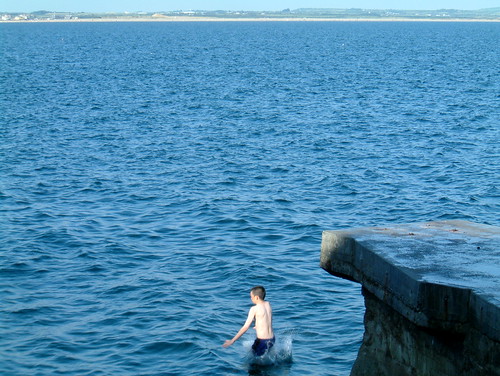
Another favorite each year is the Tramore Races, a more than 200-year-old traditional fleecing of the local population. I've been going off-and-on since I was in low single-digits and I don't think I've ever come away with any money. Fortunately, my wife and kids are better gamblers than I am. Cara won 28 euros on a 2 euro bet, while Theresa walked away with something similar. My horses, as usual, came in dead last each time I bet on them. Maybe I should start betting on the horse I think will lose?

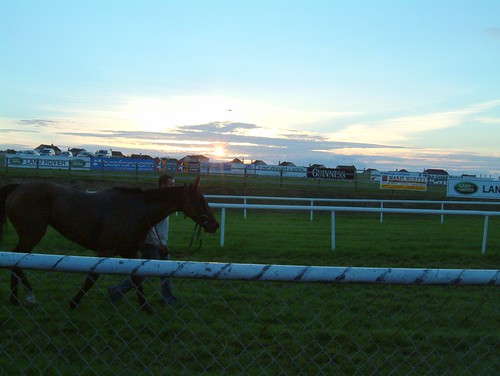
Tags: Family, Vacation, Ireland
Thursday, August 11, 2005
Sunset on Tramore
Our holiday seemed particularly fast this year. We return home the day after tomorrow and we haven't accomplished half the things we normally do.
An important to-do items that I have accomplished is to think of goals for the next year. I'm keeping my aim simple -- to enjoy everyday life more. I've finally figured out (after 42 years) that work and everyday tasks shouldn't be something you suffer through until you get the occasional holiday. I'm not going to wait until I win the lottery or retire to start living. It starts now.
Tuesday, August 09, 2005
Ailish's photos from the U.S.
I uploaded some of Ailish's photos from the states (and here in Tramore) from her digital camera, before they get lost. She's been away from a broadband connection for several weeks, traveling among the relatives. More of her photos can be found here.
Tramore dunes
I've been going to Tramore, Ireland, most years since I was about 2 years old. And I've probably walked around the Tramore Dunes several times, every year. But I realise I know little about them, so this year we signed up for a tour of the area with a recent ecology graduate. We probably knew more about the area than the tour guide (we were her first ever public tour), but we did learn several new things. For one, the terrain is extremely rare in Europe. There are almost no wetlands like it anywhere in Europe. Some of the last of it has been filled in and used for golf courses in Portugal.
More photos of our tour can be found here.
Monday, August 08, 2005
Another beach day
It's usually around this point of our annual vacation to Ireland, after the first week and just as Theresa gets up the nerve to get into the water, that I begin to seriously consider whether I should simplify my life. Why do I work 14 hours a day? Theresa can work anywhere as a nurse. I could start freelancing again. I keep telling myself that we're seeing Tramore as it is in the summer. In the winter, it's probably pretty dire. And I somehow doubt that its schools are on the top of the league tables. Some day, though, I'm not going to come back.
Accelerando

Charles Stross's Accelerando reminded me of the TV shows Dallas or Dynasty. Set in an earlier epoch than his first two books, it follows a complex, future-shocked and dysfunctional family -- and one wise-cracking artificial cat -- as humanity goes through rapid change through the 21st century.
The central character is a idealistic cyberpunk named Manfred Macx who prides himself on being well ahead of the curve. He has several ideas before breakfast each day, files patents on them and then donates the patents to the "Free Infrastructure Foundation," an obvious direct decendant of the Free Software Foundation. The aim is to spread the wealth, make as many people rich as possible to help them over the economic upheaval Macx believes is just around the corner. The urgency increases when Macx gets an unusual request for asylum -- a group of lobsters uploaded to a computer, neuron by neuron, has achieved sentience and wants protection.
That leap in development, in which computers can host minds, begins a race against time as humanity makes more progress in 5 decades than it does in the previous 50,000 years. The resulting blurring of many lines, such as between our brains and computers, sentient and insentient beings and even time and place, brings up a stark choice: Do you cross the line and become more computer than human, or do you stay behind and retain your humanity, a Neaderthal in a modern world?
I found the book harder to grasp than Stross's first two. It was difficult to keep track of the forked copies of the main characters, and who was mother, father, grandfather or son in a universe where characters can grow old, die and then come back as youngsters. The family tree resembles brambles. This book is also built around a completely different universe than Stross's earlier work, with no shared history that I could see, but I'm looking forward to see if he continues on this track or extends the universe built in Singularity or Iron Sunrise. Accelerando seems to offer more possibilities.
[Updated to expand it a bit. I'm having trouble writing these in drips and drabs in internet cafes. I initially left out several things I wanted to say.]
Tags: Book Reviews, SciFi
Friday, August 05, 2005
Beautiful morning
Thursday, August 04, 2005
View from Below
I finally found an internet cafe in Waterford that will allow me to connect my own laptop. My aim was to upload the photos we have taken already. Unfortunately, I left the smartcard with most of our pics back at the house in Tramore, miles away. (Notice a trend here? My IQ drops at least 50 points while on vacation.) Anyway, I've managed to get a few up there and I'll try to upload some more next week. This photo is of Aidan flying his kite during a very typical Irish beach days -- cold, grey and windy. We've had some good days so far as well, so I can't complain.
Today it's pelting rain and we used the opportunity to take a trip into town. The rest of the family are at the cinema, watching Fantastic Four or Charlie and the Chocolate Factory (they split up after failing to agree).
More photos can be found here.
Wednesday, August 03, 2005
Waiting for the tide
I'm still limited to posting these crummy camera phone pictures of our holiday. The family at home will probably have to wait until we get back to see some of the shots. One thing I've learned is I need to prepare better. I went to try and put some of the good photos on my laptop and realized I didn't load the camera's software on it before I left. I'll have to wait until later in the week when I can get to a fast connection in Waterford to see if I can find the software on the Web.
Anyway, here's another low-res and dark shot. It's of the kids. You'll have to take my word for it.
Tags: Family, Vacation, IrelandMorning walk
Tuesday, August 02, 2005
Elephants
The first day on the beach: I get out of the car, glance at the sea, and freeze. My brain can't quite grasp what I'm seeing. The circus is in town, so the trainer brought these two down to the strand. They weren't tethered in any way. The elephants went way out -- up to their necks -- and splashed around for a while. When they were finished, they just calmly walked in, looked around for the trainer and followed him back. I got some good shots on the real camera, but until I find a way to upload them, you'll have to make do with these crummy camera phone pics.
Tags: Family, Vacation, Ireland
